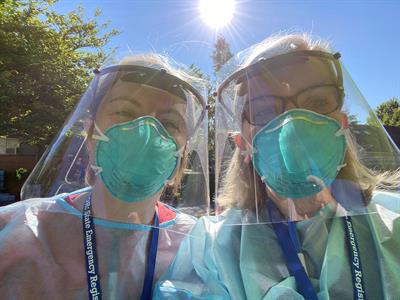国家公共卫生周:介绍Engrav博士
April 5-11 is National Public Health Week. It is a time to recognize the contributions made by those in public health to improve the livelihood of our communities.
CareOregon recognizes our Medical Director, Mary Engrav, MD, for her work in our community. From her volunteer work administering COVID-19 vaccines at the Convention Center, to her recent confirmation to the Oregon Patient Safety Commission (OPSC), there’s more to her than meets the eye.
We asked her a few questions and she graciously provided answers.
Thank you for all you do, Dr Engrav!
- You have been volunteering your time administering COVID-19 vaccines at the Oregon Convention Center. Can you elaborate on that experience?
 A: I have volunteered with SERV-OR, which is Oregon’s Medical Crisis response unit, since 2001. For the first
20 years there were very few volunteer needs, but that all changed with COVID in 2020. Initially SERV-OR staff, which consists of physicians, nurses (including CareOregon RNs like Rachel Jean, left, pictured with Dr Engrav, right),
and other medical professionals worked in COVID testing tents that were set up in our communities in medically underserved areas. Patients could drive through or walk through and receive COVID testing during the pandemic.
A: I have volunteered with SERV-OR, which is Oregon’s Medical Crisis response unit, since 2001. For the first
20 years there were very few volunteer needs, but that all changed with COVID in 2020. Initially SERV-OR staff, which consists of physicians, nurses (including CareOregon RNs like Rachel Jean, left, pictured with Dr Engrav, right),
and other medical professionals worked in COVID testing tents that were set up in our communities in medically underserved areas. Patients could drive through or walk through and receive COVID testing during the pandemic. In recent months, our efforts turned to vaccination. Kaiser, OHSU, Providence, Legacy and the National Guard joined together to administer a mass testing site at the Oregon Convention Center. SERV-OR volunteers and many other team members began administering vaccine at the site to between 6,000-8,000 patients per day.
I have been very impressed with how well the hospital systems have worked together. The staff have been amazingly organized and professional.
In a past life, you were an ER physician. How does that experience translate to becoming the Medical Director for a public health care organization?
A: As an Emergency Physician for 24 years in the Providence and Legacy systems, I worked in busy ERs that served individuals who often had difficulty accessing care outside of the ER. For most of my career in fact, many of our patients were uninsured. That began to change with the Affordable Care Act and Medicaid expansion, and it was wonderful to have patients now able to access a primary care doctor and services for preventive care.
I actually first met Dr. Amit Shah (CareOregon’s Chief Medical Officer) and Dr. Doug Luther (CareOregon’s Senior Medical Director) over 20 years ago while working in the ER, and later learned from them about the work that CareOregon was doing to provide patients with high quality medical care. So I was very happy to join the CareOregon team three years ago.
- Some may not know what a Medical Director does in the grand scope of health care. What is a good example of a Medical Director’s influence on public health?
A: We have a wonderful team of nurses and medical directors at CareOregon. The Medical Management team works to ensure that CareOregon patients receive medical care that is safe and appropriate. We work closely with our Case Management team to ensure that high-risk patients have access to the care they need and assist them if they need help navigating the health care system.
An example would be a patient who may be homeless with a new cancer diagnosis. The Medical Management team may identify that patient through a chart review, and work closely with the Case Management team to ensure the patient is able to obtain the treatments they need, get to their appointments, obtain their medications, and work towards housing stability.
- You were recently confirmed to the Oregon Patient Safety Commission (OPSC). Can you elaborate on your role and what the commission does for public health?
A: Through my role at CareOregon, I was recently appointed by the Governor and confirmed by the legislature to serve on the OPSC, which works to improve patient safety and quality of care. If a patient in Oregon has had a health care safety concern, they can bring the issue forward to the Safety Commission, who will then work with the medical providers and facility to address the concern and improve the quality of care for all patients. It is a great way for patients to have concerns addressed and to give patients a voice in Oregon’s health care.

Dr Engrav has served as Medical Director at CareOregon since 2018. She is a graduate of Creighton Medical School and completed Residency at OHSU in 1993, serving as Chief Resident. She then worked for 24 years as an Emergency Physician in the Providence and Legacy health systems, caring for adult and pediatric emergency patients.
